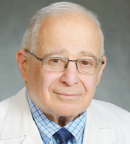
Eli J. Glatstein, MD, FASCO
Eli J. Glatstein, MD, FASCO, Morton M. Kligerman Professor, Radiation Oncology, Perelman School of Medicine at the University of Pennsylvania, Philadelphia, made a significant impact on how different cancers are diagnosed and treated. His research improved how physicians stage and treat cancer, especially Hodgkin lymphoma. But it was in the early 1970s, while working at the National Cancer Institute (NCI), that Dr. Glatstein successfully integrated different modalities of cancer treatment by combining radiation oncology with medical oncology, essentially changing the status of radiation oncology within the general cancer community itself.
“During the course of his esteemed career, Eli Glatstein was dedicated both to his patients and to the young physicians under his charge; he was a renowned authority who encouraged new ideas, new approaches, and new thinking,” remarked his long-time friend and colleague, James Metz, MD. Dr. Glatstein died on November 27, 2019, at age 81.
Small-Town Upbringing
Dr. Glatstein was born and reared in Muscatine, Iowa, a town of some 20,000 people stretched along the lip of the Mississippi River. Muscatine is known as the “Watermelon Capital of the World,” a sobriquet that reflects the rural nature of the county it inhabits. During an interview conducted for the American Society for Radiation Oncology website, he explained that from a young age, he was bound and determined to be a doctor. “I’d been generously tutored, so to speak, by a family physician who took interest in me, and his son was my best friend, so we got along very well. And it just sort of followed that that’s what I wanted to do.”
After graduating from high school, Dr. Glatstein earned his undergraduate degree with highest honors in general science from the State University of Iowa. He immediately went on to receive his MD from the Stanford University School of Medicine in 1964, followed by a medical internship in internal medicine at New York Hospital.
I’d like to be remembered as someone who said what he thought and said it honestly. I think I’ve tried to do that.— Eli J. Glatstein, MD, FASCO
Tweet this quote
Dr. Glatstein originally decided to begin studying to be a pathologist. He applied to the pathology program, was accepted, and had planned to attend the Mallory Institute of Pathology in Boston, until he was drafted into the U.S. Army in 1964. He was awarded the Bronze Star for his efforts during active combat in the Vietnam War.
After his tour of duty in Vietnam, Dr. Glatstein followed his instincts and returned to Stanford University, enrolling in the general radiology program. “I happened to start off on radiation oncology and, by the end of the first day, I was hooked,” Dr. Glatstein recalled in an interview for the ASCO Daily News in 2010.
During his residency at Stanford University, Dr. Glatstein was mentored by both Henry S. Kaplan, MD, and Saul A. Rosenberg, MD, who Dr. Glatstein regarded as “superb communicators and outstanding teachers.”
His Career Hits High Gear
He left Stanford to become Head of the Radiation Oncology Branch at the NCI, where he mentored a brilliant team of radiation oncologists who have become leaders in the field today. An interest in particle therapy brought Dr. Glatstein to The University of Texas Southwestern Medical Center in Dallas, where he served as Professor and Chair of the Department of Radiation Oncology.
He joined the Perelman School of Medicine at the University of Pennsylvania in 1996 as Professor and Vice Chairman of the Department of Radiation Oncology, where he had considerable influence over the past 23 years. Dr. Glatstein’s knowledge and leadership shaped Penn Radiation Oncology into the world-renowned department it is today, and he exemplified the core tenet of culture at Penn Medicine: “Excellence is standard.”
As a mentor, and giant in the field, he helped educate and inspire students far and wide, further extending his influence and legacy, including Allen S. Lichter, MD, FASCO, ASCO’s former Chief Executive Officer, and Joel E. Tepper, MD, FASCO, a member of the ASCO Board of Directors, each highly accomplished investigators and leaders in their own right.
A Pioneer in Photodynamic Therapy
During his esteemed career, Dr. Glatstein’s principal interests were lymphoma, sarcoma, and lung cancer. He was known for his contributions in each of those fields, as well as for his work in radiation biology. In the past 30 years, his primary passion was photodynamic therapy, in which he led pioneering work on use of the technique intraoperatively for pleural-based malignant diseases. Although he was a radiation oncologist by training, he was best known as an outspoken champion of multidisciplinary treatment for cancer.
Of his many professional accomplishments, he was most proud of the work he has done to improve cure rates for patients with lymphoma, sarcoma, lung cancer, and a variety of other malignant diseases. “What I enjoy most is actually interacting with patients and trainees in an attempt to solve patient problems as best we can,” he told the ASCO Daily News. In 2010, he received the Society’s Distinguished Achievement Award, which honors an individual who has proven to be as an outstanding leader and mentor in the area of science, practice, or research in any subspecialty of oncology that has benefited ASCO members and/or their patients.
Asked how he’d like to be remembered, Dr. Glatstein responded with his well-known humility, “I’d like to be remembered as someone who said what he thought and said it honestly. I think I’ve tried to do that. Nobody is perfect and that certainly includes me. But I think there are things that need to be said, and I’m perfectly willing to say them. I don’t have any illusions about perfection. I have feet of clay like everyone else.” ■

